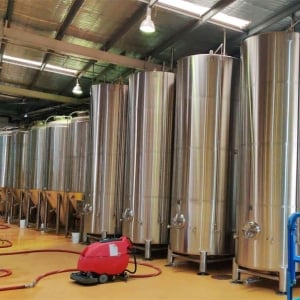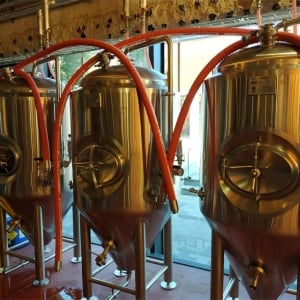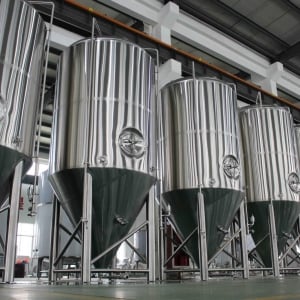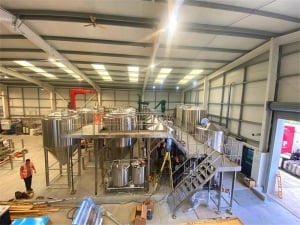Table of Contents
ToggleWhat is Microbrewing Equipment?
Microbrewing, often referred to as craft brewing, is the process of brewing beer on a relatively small scale for personal, non-commercial use. Microbrewing equipment, therefore, encompasses a range of tools and devices used in this process.
Starting from the basics, the key components include:
- Mash Tuns: Used to convert the starches in crushed grains into sugars.
- Boilers: Where the wort (the liquid extracted from the mashing process) is boiled with hops.
- Fermenters: Vessels where the wort is transformed into beer by the yeast.
There are also several smaller pieces of equipment, including thermometers, hydrometers, and various filtering tools.
| Equipment | Purpose |
|---|---|
| Mash Tuns | Convert starches to sugars |
| Boilers | Boil wort with hops |
| Fermenters | Ferment wort into beer |
| Thermometers | Measure temperatures |
| Hydrometers | Measure the density of the liquid |
With advancements in technology, many automated systems have emerged that simplify the brewing process, making it more efficient and consistent.
How Much Does Microbrewing Equipment Cost?
When diving into the world of craft brewing, potential brewers quickly realize the wide range of equipment costs. From basic homebrewing kits to advanced commercial systems, the price range can vary significantly based on capacity, material, and automation.
For beginners, starter kits can be a great choice. These usually include all the basic tools required for small-scale brewing.
Basic Homebrewing Starter Kits:
| Kit Component | Approximate Cost (USD) |
|---|---|
| Basic Equipment Kit (with no boiling pot) | $50 – $80 |
| Boiling Pot (5 gallons) | $20 – $50 |
| Ingredient Kit | $25 – $50 |
For more serious home brewers or those looking to start a microbrewery, professional-grade equipment becomes necessary. This can range in price depending on the capacity and features.
Professional Microbrewing Equipment:
| Equipment Type | Capacity | Price Range (USD) |
|---|---|---|
| Mash Tun | 1 BBL | $1,000 – $3,000 |
| Boil Kettle | 1 BBL | $2,000 – $4,000 |
| Fermenter | 1 BBL | $2,500 – $5,000 |
For those truly committed to brewing and possibly considering commercial production, the costs can increase dramatically. Systems with larger capacities, automation, and precision instruments can cost upwards of $100,000.
Brands also play a significant role in determining the price. Some popular brands in the microbrewing equipment industry include:
- Blichmann Engineering: Known for their top-quality homebrewing and microbrewing equipment.
- Ss BrewTech: Offers a range of stainless steel brewing equipment.
- BrauKon: A high-end brand catering to professional brewers.
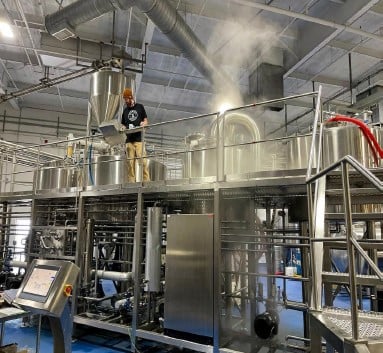
What are the Types of Microbrewing Equipment?
Diving into the craft beer world introduces enthusiasts to a myriad of microbrewing equipment designed for different scales, levels of complexity, and styles of beer. The selection is as diverse as the craft beer varieties on the market.
- Homebrewing Kits: Ideal for beginners, these kits provide almost everything needed to brew beer at home, usually designed for 5-gallon batches. Price ranges from $100 to $300, depending on the components included.
| Type | Description | Price Range (USD) |
|---|---|---|
| Extract Kit | Uses malt extract instead of grains. Easier for beginners. | $50 – $100 |
| All-Grain Kit | Uses actual grains, offering more flexibility in beer flavors. Requires additional equipment. | $150 – $300 |
- All-in-One Electric Brewing Systems: A step up from basic kits, these electric systems simplify the process by combining several brewing steps into one vessel. Prices can vary from $300 to $1,500 based on size and features.
- Modular Homebrewing Systems: These setups allow brewers to expand or adjust components, making them perfect for those aiming for a specific brewing method or larger quantities. Typically priced between $500 and $2,500.
- Professional Microbrewery Systems: For commercial endeavors or serious hobbyists, these systems offer large capacities and often come with advanced features, automation, and high-grade materials. Depending on capacity and sophistication, these can range from $10,000 to $200,000.
- Fermentation Equipment: Regardless of brewing scale, fermentation is a crucial step. From simple glass carboys priced around $30 to stainless steel conical fermenters ranging from $200 to $2,000, the choice heavily depends on the brewer’s requirements and budget.
Functions of Microbrewing Equipment
Microbrewing equipment serves various specific functions in the intricate process of turning raw ingredients into delightful craft beer.
- Mashing: This process uses a mash tun. Here, crushed grains are soaked in water to convert starches into fermentable sugars, creating a sweet liquid called wort. This function is crucial as it determines the beer’s body, flavor, and alcohol content.
- Boiling: The boil kettle takes the stage. The wort from the mash tun is boiled, typically with hops added to impart bitterness, flavor, and aroma. This boiling process also serves to sterilize the wort, eliminating any unwanted microorganisms.
- Cooling: After boiling, the wort needs to be cooled rapidly to a temperature suitable for fermentation. A wort chiller performs this task. By cooling quickly, brewers ensure that the yeast, when added, can start fermenting the wort without any competition from unwanted bacteria.
- Fermentation: This is where the magic happens! Using fermenters, the cooled wort is exposed to yeast. Yeast consumes the sugars from the wort, producing alcohol and carbon dioxide. This process can last from a few days to several weeks, depending on the beer style.
- Conditioning: After fermentation, the beer is transferred to another vessel, often called a conditioning tank or brite tank. Here, beer matures and develops its full flavor profile. Any remaining unwanted particles also settle at the bottom.
- Packaging and Carbonation: Once conditioned, the beer is ready for packaging. Whether it’s kegging or bottling, many systems offer integrated solutions for this final step. Some setups also allow for carbonation control, ensuring the perfect fizziness level for each beer style.
Applications of Microbrewing Equipment
Craft beer has become more than just a beverage; it’s a global phenomenon, celebrated for its taste, diversity, and the creativity of its brewers. The varied applications of microbrewing equipment have played a significant role in this revolution, enabling brewers to innovate and experiment.
- Homebrewing: The rise in popularity of craft beer has seen many beer lovers try their hand at brewing at home. The thrill of creating a unique beer and sharing it with friends and family has drawn many to this hobby. Homebrewing equipment allows enthusiasts to replicate professional brewing processes on a smaller scale, with equipment tailored to fit in regular kitchens or garages.
- Craft Breweries: These are establishments that produce beer on a relatively small scale, usually much smaller than large-scale corporate breweries. They often emphasize flavor, quality, and brewing technique. Microbrewing equipment here serves to produce batches ranging from a few barrels to several hundred barrels.
- Brewpubs: A fusion between a brewery and a pub or restaurant, brewpubs brew their beer on-site and sell it directly to consumers. Microbrewing equipment in these settings is often visibly integrated into the dining area, allowing patrons to view the brewing process.
- Pilot Brewing: Before scaling up to larger batches, breweries often test recipes on a smaller scale using pilot brewing systems. This allows them to refine the taste, check quality, and ensure consistency. Microbrewing equipment is essential for this experimental phase.
- Educational Settings: With the rise of craft beer’s popularity, many institutions now offer brewing courses. Whether it’s a short workshop or a detailed professional course, microbrewing equipment is used to provide hands-on experience.
- Special Events and Festivals: Craft beer festivals, competitions, and special events often showcase unique or limited-edition beers. Many brewers use smaller equipment to create one-off batches for such occasions.
- Research and Development: Larger breweries or entities involved in brewing research often utilize microbrewing equipment for R&D purposes. This might involve testing new ingredients, refining processes, or developing innovative brewing techniques.
- Collaborative Brews: Collaboration between breweries is a cherished tradition in the craft beer community. Breweries often come together to brew special edition beers, sometimes using microbrewing equipment to ensure precision and hands-on collaboration.
From homes to establishments and festivals, microbrewing equipment has carved a niche for itself, allowing for a diverse array of applications. It has democratized the art of brewing, enabling anyone from a novice to a professional to brew beer and contribute to the ever-evolving world of craft beer.
How Does Microbrewing Equipment Benefit You?
Microbrewing equipment, while serving its primary purpose of brewing beer, offers users a multitude of benefits that extend beyond just the crafting of alcoholic beverages.
- Education & Skill Acquisition: Utilizing microbrewing equipment educates users on the detailed processes of beer production. Brewing involves understanding various facets such as chemistry, biology, and even physics. As one refines their brewing technique, they acquire a unique skill set, transforming from a novice to an adept brewmaster over time.
- Customization & Creativity: One of the primary advantages of having personal brewing equipment is the freedom to experiment. Brewers can tweak ingredients, time durations, temperatures, and more to create a beer that’s tailored to their preferences. This paves the way for unique brews that can’t be found in commercial markets.
- Cost-Effective in the Long Run: While the initial investment in microbrewing equipment might seem steep, it proves to be cost-effective over time. By brewing at home, one can produce beer at a fraction of the cost of store-bought equivalents. Not to mention, the satisfaction of consuming a self-crafted brew is priceless.
- Environmental Impact: Home brewing can be more environmentally friendly. By eliminating the need for transportation, packaging, and marketing, the carbon footprint of a homebrewed beer is significantly lower. Reusing bottles and kegs further reduces waste.
- Social Aspect & Community Building: Microbrewing has a robust community around the world. Owning brewing equipment often leads individuals to join homebrew clubs, participate in beer tasting events, and even organize brewing sessions with friends and family. Such activities foster community building and create lasting bonds among enthusiasts.
- Economic Opportunities: As one becomes proficient with their microbrewing equipment and perfects their recipes, there’s potential for commercial opportunities. Many successful craft breweries started as small homebrew projects. With the right brew and a touch of entrepreneurship, a hobby can transition into a profitable venture.
- Control Over Ingredients: Brewing at home gives complete control over what goes into the beer. This ensures the absence of preservatives, additives, or any unwanted ingredients. For those with specific dietary restrictions or preferences, this control is invaluable.
How to Choose Microbrewing Equipment?
For budding brewers or even experienced ones looking to upgrade, selecting the right microbrewing equipment can be a challenging task. With various options, brands, and specifications, the choice can be overwhelming. Here’s a guide to making that decision smoother.
- Determine Your Brewing Scale: Before investing in equipment, decide on the scale you’re aiming for. Are you brewing just for personal consumption, hosting parties, or even considering selling your brew? Equipment varies in capacity from small homebrew kits to industrial-sized systems.
- Decide on a Budget: Microbrewing equipment can range from relatively inexpensive to quite pricey. Set a budget early on. This will help narrow down choices and ensure you get the best value for your money.
| Price Range (USD) | Suitable For |
|---|---|
| $100 – $500 | Basic homebrewing kits for beginners |
| $500 – $2,500 | Advanced homebrew setups and small brewpubs |
| $2,500 and above | Commercial microbreweries and large-scale brewing |
- Choose the Brewing Method: There are primarily two brewing methods – extract brewing and all-grain brewing. Extract brewing is simpler, using malt extracts. All-grain brewing offers more control over the final product but is more complex and requires more equipment.
- Evaluate Material & Build Quality: The material of the equipment, especially for vessels that will hold the beer, is crucial. Stainless steel is the preferred choice due to its durability, resistance to corrosion, and ease of cleaning.
- Automation vs. Manual: Some brewing systems come with automated features, controlling temperature, flow rates, and timings. While these can simplify the process, they are typically more expensive. Manual systems, on the other hand, require more hands-on involvement but offer a more intimate brewing experience.
- Check Reviews & Recommendations: Before making a purchase, consult online reviews, forums, and fellow brewers. Personal recommendations and experiences can provide insights that product descriptions and advertisements might not.
Choosing the right microbrewing equipment is a blend of understanding personal requirements, budget constraints, and desired brewing methods. With proper research and consideration, one can find the perfect set-up that caters to their brewing ambitions.
Best 10 Microbrewing Equipment Manufacturers
The global surge in craft beer popularity has led to an increase in manufacturers producing microbrewing equipment. Whether you’re a novice homebrewer or a seasoned professional, it’s crucial to invest in quality equipment. Here are the top 10 microbrewing equipment manufacturers that have earned their reputation in the industry.
- Blichmann Engineering: Renowned for their innovative designs and high-quality materials, Blichmann is a favorite among many brewers. Their products cater to both beginners and professionals.
- Ss BrewTech: Pioneers in introducing professional-grade stainless steel equipment to homebrewers, Ss BrewTech offers a range of brewing vessels and fermenters.
- BrauKon: Known for their high-end brewing solutions, BrauKon caters predominantly to craft breweries. Their systems emphasize efficiency and consistency.
- Speidel: A German brand with decades of history, Speidel offers fermenters and tanks known for their durability and design.
- Grainfather: Perfect for homebrewers, Grainfather offers all-in-one brewing systems. Their products are praised for their ease of use and automation features.
- MoreBeer!: A comprehensive supplier, MoreBeer! offers everything from ingredients to brewing systems. Their vast range caters to all levels of brewing expertise.
- Portland Kettle Works: PKW provides brewing systems specifically for craft breweries. Their focus on energy efficiency and sustainability sets them apart.
- PicoBrew: Targeting the homebrewing segment, PicoBrew’s machines are designed for convenience and simplicity. They’re suitable for those looking for almost automatic brewing experiences.
- ProBrew: Catering to professional craft breweries, ProBrew delivers turnkey solutions. They’re known for their high-quality systems and automation features.
- Stout Tanks and Kettles: Specializing in stainless steel equipment, Stout offers a range of fermenters, kettles, and brewhouses. Their products are well-regarded for their build quality.
Choosing a manufacturer often depends on individual needs, budget, and the scale of brewing. It’s advisable to conduct thorough research, compare features, and consult reviews before making an investment in any equipment.
Where to Buy Microbrewing Equipment?
Navigating the world of microbrewing equipment can be challenging, especially when trying to decide where to make a purchase. The choices range from online platforms, local stores to direct manufacturer purchases. Here’s a comprehensive guide on where to buy quality microbrewing equipment.
- Online Retailers: Websites such as Amazon, eBay, and specialized brewing sites like Northern Brewer and MoreBeer! provide a vast array of equipment choices. Shopping online offers the advantage of comparing prices, reading reviews, and having the equipment delivered to your doorstep.
- Local Homebrew Shops: For those who prefer to physically inspect the equipment before purchase, local homebrew shops are an excellent choice. These stores often carry a selection of popular brands and the staff can offer insights and recommendations based on individual needs.
- Directly from Manufacturers: Many equipment manufacturers, like Blichmann Engineering and Ss BrewTech, allow customers to buy directly from their websites. This method ensures you get an original product and can sometimes lead to better deals.
- Craft Beer and Brewing Expos: Annual events and trade shows dedicated to brewing often feature stalls by microbrewing equipment manufacturers. These expos are not only a great place to purchase equipment but also to network and gain knowledge.
- Used Equipment Platforms: Websites like ProBrewer and forums often have listings for used microbrewing equipment. This option can be more affordable but requires a careful examination of the equipment’s condition.
- Local Craft Breweries: Some breweries upgrade their equipment and might be willing to sell their older but still functional gear. Building a rapport with local breweries can lead to opportunities to purchase such equipment.
Product Advantages of Chinese Microbrewing Equipment
China, a manufacturing powerhouse, has rapidly risen in the realm of microbrewing equipment production. The advantages of opting for Chinese-made brewing equipment are manifold.
- Cost-Effectiveness: One of the most significant advantages of Chinese microbrewing equipment is the price. Due to lower manufacturing costs, Chinese companies can often offer competitive prices for high-quality equipment compared to Western counterparts.
- State-of-the-art Facilities: Companies like YoLong Brewtech have invested in state-of-the-art manufacturing plants. With over 15 years of experience in the brewery equipment manufacturing business, YoLong Brewtech operates from a 36,000 m2 facility in the Ningbo City Economic Development Zone.
- Customization: Chinese manufacturers are known for their flexibility in meeting customer specifications. YoLong Brewtech, for example, is renowned for fabricating custom-designed equipment tailored to the client’s exact requirements.
- Diverse Product Range: Whether it’s equipment for brewing beer, kombucha, cold-brewed coffee, or infused teas, Chinese manufacturers cater to a broad spectrum of brewing needs.
- Quality Control: With the growth in demand, Chinese manufacturers have stepped up their quality control measures. Companies have adopted international standards, ensuring their products are both durable and efficient.
- Global Shipping & Logistics: Most Chinese brewing equipment manufacturers have established robust shipping and logistics chains. This ensures timely delivery of products across the globe.
- After-sales Service: After recognizing the importance of post-purchase customer support, many Chinese companies have bolstered their after-sales services. This includes installation guidance, maintenance, and part replacements.
- Innovation: In the race to stand out, many Chinese manufacturers invest in R&D to introduce innovative features in their equipment. This ensures they remain competitive and offer the latest in brewing technology.
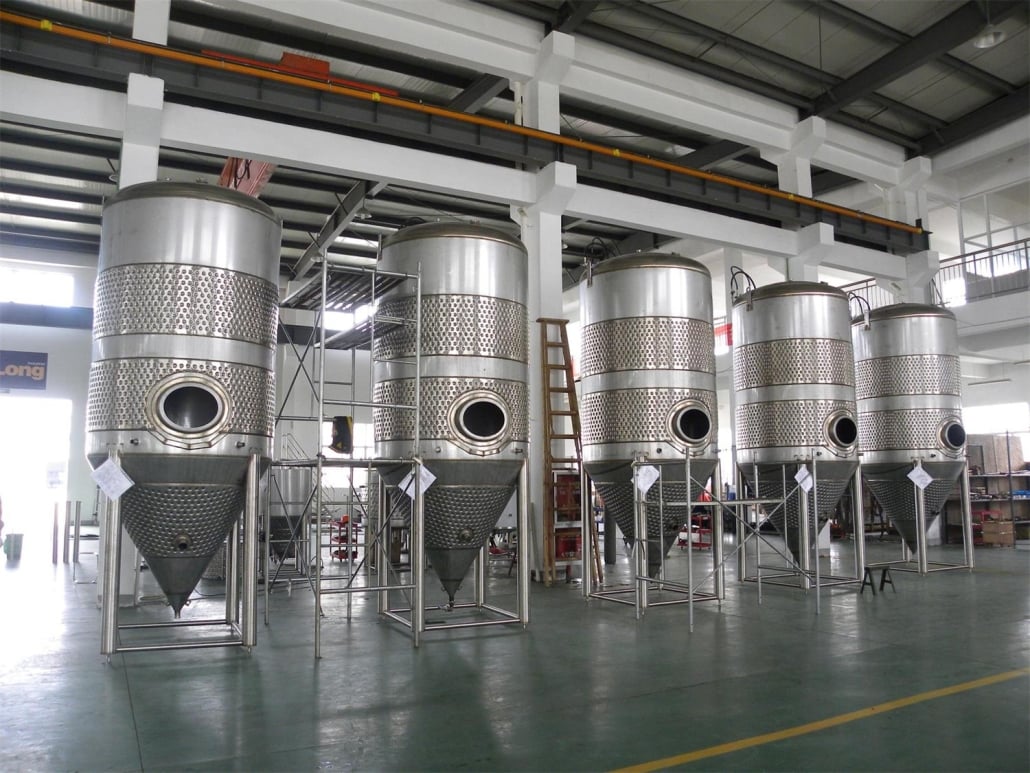
Best Chinese Microbrewing Equipment Supplier
When it comes to microbrewing equipment suppliers from China, several names stand out. However, among them, YoLong Brewtech has earned a prominent position. Let’s dive into what sets them apart.
- Established Reputation: Founded in 2004, YoLong Brewtech boasts over 15 years of experience. This has allowed them to refine their processes and products, making them an industry favorite.
- Versatile Product Range: Not limiting themselves to just beer, YoLong caters to various beverage sectors. Their product range includes equipment for crafting beers, cold-brewed coffee, kombucha, infused teas, and wine.
- Customization is Key: YoLong Brewtech prioritizes the unique needs of each customer. Their commitment to fabricating custom-designed projects to exact client specifications sets them apart from many competitors.
- Advanced Manufacturing Plant: The state-of-the-art 36,000 m2 manufacturing facility in Ningbo City is testament to YoLong’s commitment to quality and efficiency. This expansive facility ensures every product is crafted with precision.
- Meeting Global Standards: YoLong Brewtech doesn’t just cater to the domestic market. Their products are designed and manufactured to meet global standards, making them a trusted name in international markets.
With a blend of experience, commitment to quality, and an expansive product range, YoLong Brewtech emerges as a top recommendation for those seeking microbrewing equipment from China.
FAQ
1. Why is there a significant price difference in microbrewing equipment?
Different brands and manufacturers have varying production costs, which can be influenced by factors such as material quality, production technology, labor costs, and brand reputation. Moreover, additional features and capabilities can also affect the price.
2. How often should I maintain or service my microbrewing equipment?
Routine maintenance ensures the longevity and efficiency of the equipment. It’s advisable to clean and sanitize after every brewing session. However, for thorough maintenance like checking seals, gaskets, and electrical components, a periodic check every 3-6 months is recommended.
3. Can I use the same equipment for brewing beer and kombucha?
While some equipment like fermenters can be used interchangeably, it’s crucial to ensure thorough cleaning and sanitization between different brews to prevent cross-contamination.
4. What’s the significance of custom-designed microbrewing equipment?
Custom-designed equipment is tailored to fit specific brewing needs and space constraints. They offer flexibility in design, size, and function, ensuring that brewers get equipment that perfectly fits their requirements.
5. Are Chinese microbrewing equipment suppliers reliable?
Yes, many Chinese suppliers, like YoLong Brewtech, have garnered a reputation for producing high-quality and efficient brewing equipment that meets global standards. However, as with all suppliers, due diligence is recommended before making a purchase.
6. What’s the average lifespan of microbrewing equipment?
With proper care and maintenance, high-quality microbrewing equipment can last several years. Stainless steel components, which are common in brewing equipment, are known for their durability. Most equipment, if well-maintained, can last anywhere from 10 to 20 years or even longer.
7. How do I know if a piece of equipment is right for my brewing needs?
It’s essential to understand your brewing goals, the scale of production, and the available space. Consulting with manufacturers or experts in the field can provide insights. Reading reviews and seeking recommendations from fellow brewers can also guide you to make an informed decision.

